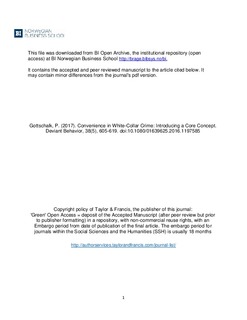Convenience in white-collar crime: Introducing a core concept
Journal article, Peer reviewed
Accepted version
Permanent lenke
http://hdl.handle.net/11250/2479955Utgivelsesdato
2016Metadata
Vis full innførselSamlinger
- Publikasjoner fra CRIStin - BI [1015]
- Scientific articles [2181]
Sammendrag
This article is concerned with white-collar criminals and considers the role of convenience in explaining crime occurrence. The article puts forward convenience as a theoretical concept that underlies existing theories and research on white-collar crime. Convenience seems present in all three dimensions of crime: economic dimension, organizational dimension, and behavioral dimension. Convenience in white-collar crime implies savings in time and effort by privileged and trusted individuals to solve a problem, where alternatives seem less attractive, and future threats of detection and punishment are minimal. The proposed theory of convenience in white-collar crime emerges as an integrated explanation in need of more theoretical work as well as empirical study.
Beskrivelse
This file is the accepted and peer reviewed manuscript to the article. It may contain minor differences from the journal's pdf version.
